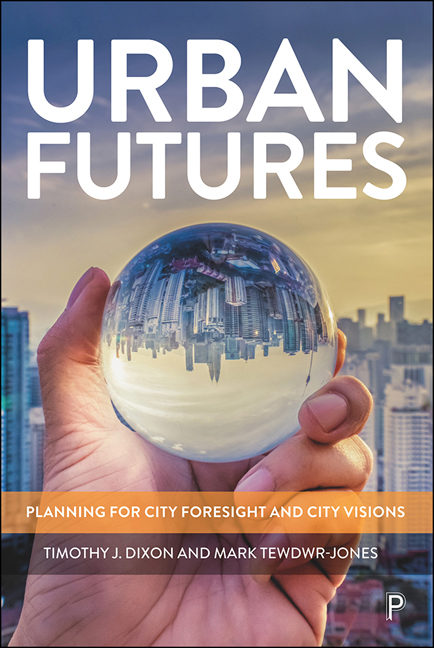Book contents
- Frontmatter
- Contents
- List of figures, tables and boxes
- Acknowledgements
- Foreword
- Preface
- 1 Urban futures: planning for city foresight and city visions
- 2 Cities and integrated urban challenges
- 3 Reimagining the city: views of the future from the past and present
- 4 Planning and governing the future city
- 5 Future narratives for the city: smart and sustainable?
- 6 Theoretical approaches to urban futures
- 7 Using city foresight methods to develop city visions
- 8 Shaping the future: city vision case studies
- 9 The innovative and experimental city
- 10 Visioning and planning the city in an urban age: a reality check
- 11 Conclusions: facing the urban future to 2050 and beyond
- Appendix: selected examples of city visions
- Notes
- References
- Index
9 - The innovative and experimental city
Published online by Cambridge University Press: 21 December 2021
- Frontmatter
- Contents
- List of figures, tables and boxes
- Acknowledgements
- Foreword
- Preface
- 1 Urban futures: planning for city foresight and city visions
- 2 Cities and integrated urban challenges
- 3 Reimagining the city: views of the future from the past and present
- 4 Planning and governing the future city
- 5 Future narratives for the city: smart and sustainable?
- 6 Theoretical approaches to urban futures
- 7 Using city foresight methods to develop city visions
- 8 Shaping the future: city vision case studies
- 9 The innovative and experimental city
- 10 Visioning and planning the city in an urban age: a reality check
- 11 Conclusions: facing the urban future to 2050 and beyond
- Appendix: selected examples of city visions
- Notes
- References
- Index
Summary
He that will not apply new remedies must expect new evils; for time is the greatest innovator.
Francis Bacon, 1625The difficulty lies, not in the new ideas, but in escaping from the old ones, which ramify, for those brought up as most of us have been, into every corner of our minds.
John Maynard Keynes, 1936Introduction
Cities play a vital role in the process and ultimate outcomes of innovation. By their very nature they can acts as hubs of creativity and new ideas, brought about by the concentration of people, businesses and sources of capital to fund innovation. The agglomeration of these crucial elements of urban innovation can create opportunities for key stakeholders in the city, not only for working together collaboratively to develop a participatory-based vision for the city, but also for coproducing projects and experiments that potentially create jobs and economic growth for the city.
Innovation and experimentation are at the heart of how a managed transition to a sustainable future can be influenced and shaped by a series of planned and strategic projects, which can, for example, also underpin a vision of the city as smart and sustainable (Dixon et al, 2018a). The role of a university in the city and its engagement in a civic role has been highlighted as fundamentally important not only in economic growth theory and innovation theory, but also in city visioning literature.
In this chapter, we will examine the importance of cities as centres for urban innovation and urban experiments, before looking at some of the most important spaces that have developed in cities for those activities, including innovation districts, living labs, urban rooms and science shops. We then look at the concept of ‘place-based leadership’ and the role of the university in visioning, experimentation and innovation, before examining a detailed case study of urban innovation and civic engagement at Newcastle University.
Cities, urban innovation and urban experiments
Throughout history, cities have been at the heart of new and transformative ideas and innovations, in both the technological and social spheres. During the renaissance, city states such as Delft, Florence and Venice were very successful, acting as hubs of innovative thinking, which led to these cities outcompeting even nation states in terms of economic growth (Kattel et al, 2011).
- Type
- Chapter
- Information
- Urban FuturesPlanning for City Foresight and City Visions, pp. 181 - 200Publisher: Bristol University PressPrint publication year: 2021



